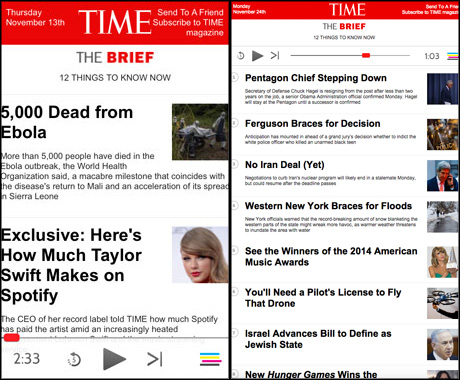SpokenLayer is designed to allow users to listen to news at times when traditional media might be inconvenient.
"At the end of the day, every smartphone user has a set of headphones and every print media publisher is ignoring them," said SpokenLayer CEO and founder Will Mayo, speaking to Journalism.co.uk at the recent News Xchange conference in Prague.
"That's the way millennials and a younger generation of multi-taskers are expecting content to be presented to them, so we see a real, huge opportunity in enabling publishers and print media to tap into the mobile, on-the-go audience."
SpokenLayer works via a line of Javascript which monitors when new articles are produced. These stories are then distributed to a global actors and voiceover artists who record the text and upload it to the SpokenLayer platform, a process Mayo says takes 15 to 20 minutes.
The next time that story is loaded – either on mobile or web – an audio player appears which allows the user to listen to it if they choose, rather than read the text.
"This isn't days or weeks," he said. "News is ephemeral, and so we gear the service towards creating content really quickly, so that we can even do breaking and real-time news."

Screengrab of SpokenLayer functionality from the Time mobile app (right) and Time website
Outlets currently using SpokenLayer include Time and Smithsonian.
The platform originally started two years ago as a consumer-facing app until they "realised that wasn't the right way to do it" and relaunched at the beginning of 2014 as a B2B company.
Other narration apps include Umano, which has consumer focus and allows users to submit articles they would like to be converted to audio.
Mayo, who is dyslexic, got the idea for SpokenLayer after having trouble finding programmes that would allow him to "listen to the web".
SpokenLayer also offers revenue opportunities around audio inventory and sponsorship, similar to the radio advertising model.
While SpokenLayer is currently working with US-based companies, Mayo said they have "a lot of international content" and are starting to expand, having just hired a new team member in London.
Pricing works on a tiered system depending on how many hours of content SpokenLayer is asked to create and how many hours are streamed, ranging from "a couple of thousand bucks a month" to "tens of thousands a month".
- Journalism.co.uk is hosting a one-day workshop in making podcasts and audio packages in London on 2 March 2015. Find tickets and more details here.
Free daily newsletter
If you like our news and feature articles, you can sign up to receive our free daily (Mon-Fri) email newsletter (mobile friendly).
Related articles
- Three free AI-powered transcription tools for journalists
- 38 mojo apps from BBC trainer Marc Blank-Settle
- What will be the lasting legacy of the pandemic on the digital media world?
- Audio, the least stressful medium for news? Yes and no
- James Hewes, CEO of FIPP, on the legacy of the pandemic on digital media









